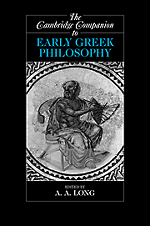Book contents
- Frontmatter
- 1 The scope of early Greek philosophy
- 2 Sources
- 3 The beginnings of cosmology
- 4 The Pythagorean tradition
- 5 Heraclitus
- 6 Parmenides and Melissus
- 7 Zeno
- 8 Empedocles and Anaxagoras
- 9 The atomists
- 10 Rational theology
- 11 Early interest in knowledge
- 12 Soul, sensation, and thought
- 13 Culpability, responsibility, cause
- 14 Rhetoric and relativism
- 15 Protagoras and Antiphon
- 16 The poetics of early Greek philosophy
- Bibliography
- Index
1 - The scope of early Greek philosophy
Published online by Cambridge University Press: 28 May 2006
- Frontmatter
- 1 The scope of early Greek philosophy
- 2 Sources
- 3 The beginnings of cosmology
- 4 The Pythagorean tradition
- 5 Heraclitus
- 6 Parmenides and Melissus
- 7 Zeno
- 8 Empedocles and Anaxagoras
- 9 The atomists
- 10 Rational theology
- 11 Early interest in knowledge
- 12 Soul, sensation, and thought
- 13 Culpability, responsibility, cause
- 14 Rhetoric and relativism
- 15 Protagoras and Antiphon
- 16 The poetics of early Greek philosophy
- Bibliography
- Index
Summary
Unlike other books in this series, the present volume is not a “companion” to a single philosopher but to the set of thinkers who collectively formed the beginnings of the philosophical tradition of ancient Greece. Most of them wrote little, and the survival of what they wrote or thought is fragmentary, often mediated not by their own words but only by the testimony of Aristotle, Theophrastus, and other much later authors. These remains are exceptionally precious not only because of their intrinsic quality but also for what they reveal concerning the earliest history of western philosophy and science. The fascination of the material, notwithstanding or even because of its density and lacunar transmission, grips everyone who encounters it. Two of our century's most influential philosophers, Heidegger and Popper, have “gone back” to the earliest Greek philosophers in buttressing their own radically different methodologies and preoccupations. Many of these thinkers are so challenging that the small quantity of their surviving work is no impediment to treating each of them at book length. Even so, there are reasons beyond our fragmentary sources and conventional practice for presenting these and other early Greek philosophers in a collective volume.
- Type
- Chapter
- Information
- The Cambridge Companion to Early Greek Philosophy , pp. 1 - 21Publisher: Cambridge University PressPrint publication year: 1999
- 9
- Cited by

